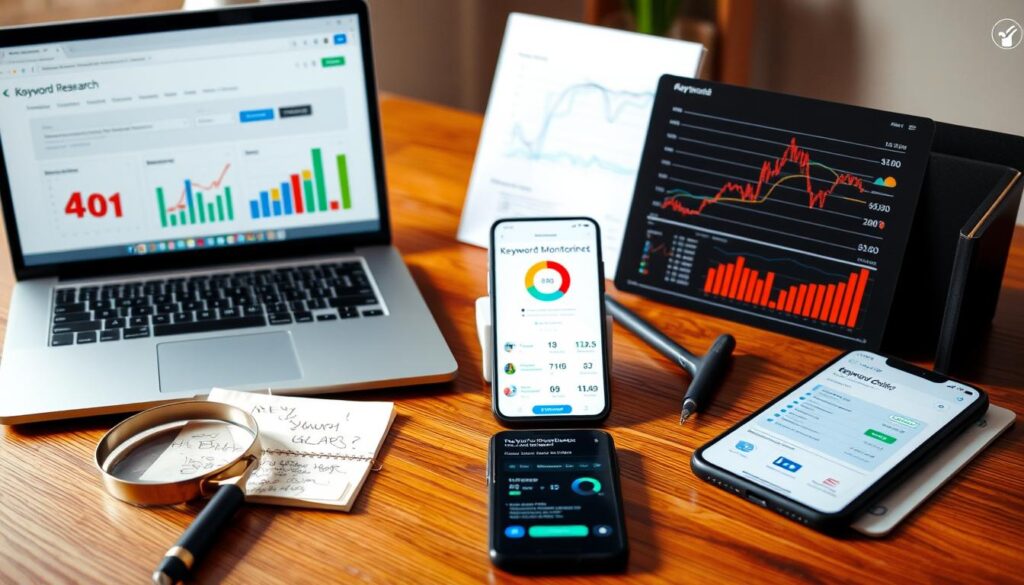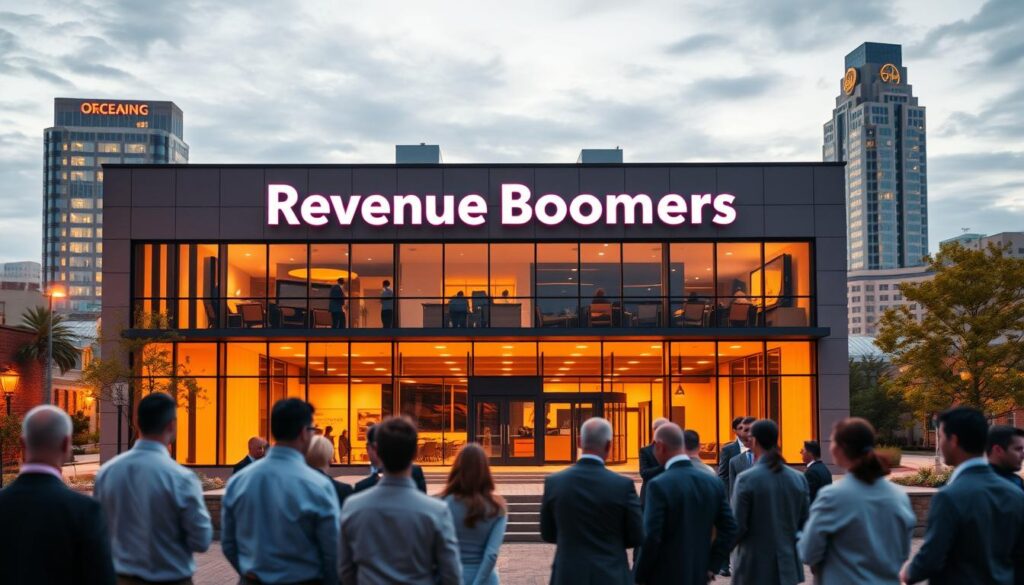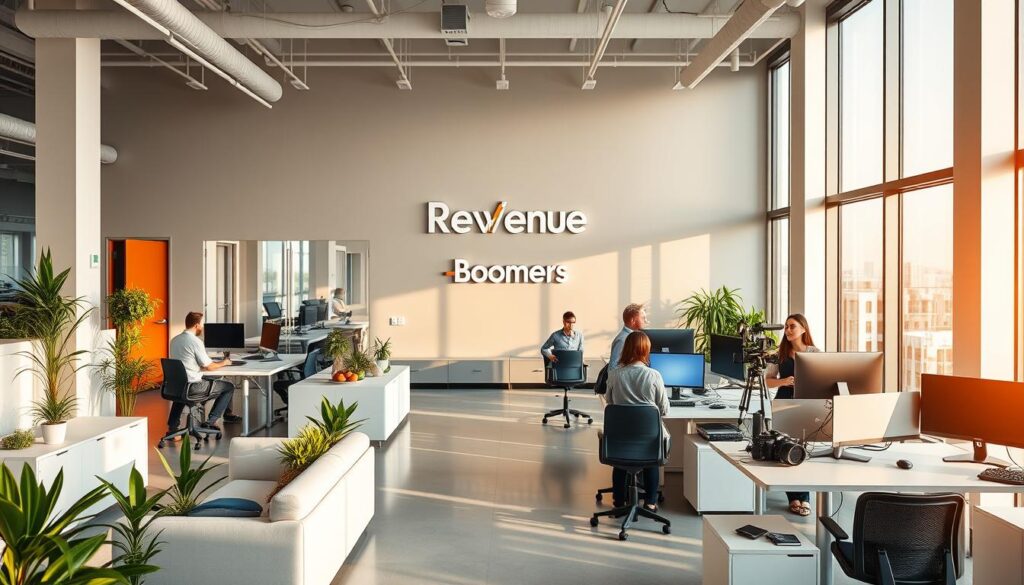Are you ignoring a key factor that could put your small business ahead? In today’s digital world, knowing about small business SEO is crucial. With Google handling 92.4% of Internet searches, good SEO can make your business easier to find. This article will share tips and insights to boost your online presence and attract more customers without spending a lot on ads.
Revenue Boomers show that smart strategies can lead to big growth. For example, Nourish Move Love got about 180k monthly visitors by using SEO well. Learn how to use affordable SEO to reach more people.
Key Takeaways
- Effective small business SEO targets niche-specific keywords to attract ideal customers.
- Ranking in the top 10 Google search results can dramatically increase your brand visibility.
- Organic traffic generally converts better for small businesses than paid advertising.
- Implementing a sound SEO strategy can provide long-term benefits and cost-effectiveness.
- Utilizing tools like Semrush helps in conducting thorough keyword research.
- On-page SEO elements play a vital role in optimizing your website for search engines.
- Establishing EEAT principles can significantly improve your search rankings.
Understanding Small Business SEO
Small business SEO helps websites get more traffic from search engines like Google. Small businesses often have less money, so they need a smart plan to improve their online presence. They make their websites better to attract the right visitors, which boosts their visibility online.
It’s key to know the difference between small business SEO and local SEO. Small business SEO helps with a wider online presence. Local SEO, on the other hand, focuses on getting customers from nearby areas. Using specific keywords that match what local customers are looking for is very important.
Using tools like Google Analytics and Google Search Console is very helpful. Google Analytics shows how people interact with your website. Google Search Console helps see how your site shows up in search results. It also helps find problems and submit your site’s map.
Having a Google Business Profile is also crucial for local businesses. It helps improve local search visibility and manage customer reviews. This supports better online visibility.
About 70-80% of internet users prefer organic search results over ads. This shows how important SEO is for small businesses. It helps them get noticed, especially on the first page of search results. Every step in improving SEO helps attract more customers and grow the business.
The Importance of Online Visibility for Small Businesses
Online visibility is key for small businesses. People often search online for what they need. If a business isn’t found online, it misses out on chances.
Search engines connect consumers with businesses. A strong online presence builds trust and credibility. It shows the online presence importance.
To be found online, small businesses need a high search engine ranking. Only 0.63% of users click on the second page of Google. So, investing in SEO is crucial.
Local SEO helps businesses show up in local searches. This brings in more relevant visitors. Having accurate info on Google Business Profile helps customers find and understand the business.
SEO boosts visibility, attracting more customers and increasing sales. By using tools like Google Keyword Planner, businesses can target the right audience. A strong online presence leads to better sales and a solid business model.

Benefits of Effective SEO Strategies
Small businesses can gain many benefits from good SEO strategies. These strategies help them be seen more online. They also make brands more known and increase sales.
Increased Brand Awareness
Being at the top of search results makes your brand more visible. This means more people see your business. It leads to more visitors and engagement.
SEO is a smart way for small businesses to reach people without spending a lot. It’s cheaper than traditional ads.
Higher Conversion Rates
Good SEO brings in people who are really looking for what you offer. They are more likely to buy from you. This is because SEO focuses on getting the right people to your site.
Using the right keywords is key to attracting this audience. Keeping your site fresh and up-to-date also helps. It makes your site better for users and improves your ranking.
| Benefit | Description |
|---|---|
| Increased Brand Awareness | Improves visibility in search results, leading to more traffic. |
| Higher Conversion Rates | Targets qualified leads, increasing chances of sales. |
| Cost-Effective Marketing | Provides a more budget-friendly option compared to paid ads. |
| Ongoing Traffic Generation | Delivers long-term benefits, ensuring traffic flow even after initial investment. |
For more on how SEO helps small businesses, check out this resource.
Small Business SEO Tips
For small businesses, boosting online visibility is key. Effective SEO practices are crucial. By focusing on targeted SEO efforts, businesses can meet their ideal customers’ needs. We’ll explore two important SEO areas: keyword research and long-tail keywords.
Conducting Effective Keyword Research
Knowing what potential customers search for is vital. Businesses should use tools like Google Keyword Planner and SEMrush. These tools reveal the best keywords, including search volumes and competition levels.
Using these keywords in website content boosts visibility on search engines.
Targeting Long-Tail Keywords
Long-tail keywords are a key part of SEO success. They are specific phrases with less competition but higher conversion potential. By targeting these keywords, businesses attract users ready to buy.
This strategy leads to more qualified leads and better SEO performance.

On-Page SEO Techniques for Small Businesses
On-page optimization is key for small businesses wanting to show up more in search results. Using meta tags, header tags, and a good content structure helps search engines see your site’s value.
Title tags should be under 60 characters to be clear to everyone. Meta descriptions under 160 characters help get more clicks. A well-organized content layout, with the right header tags, makes it easier for users to understand.

A clear content structure makes reading easier and more enjoyable. Using internal links with the right keywords helps both users and search engines find important content. This boosts your SEO.
- Use long-tail keywords that fit your business and location.
- Stick to one H1 tag per page to avoid confusion.
- Create pages for different locations with unique content.
- Add local schema markup to show up better in local searches.
- Include customer reviews to help with local SEO.
- Keep your content fresh to stay competitive.
By following these tips, small businesses can rank higher, get more organic traffic, and be more visible online.
Creating Quality Content that Engages Users
Quality content is key for small businesses online. It grabs attention and boosts SEO. By focusing on audience engagement, businesses build strong connections.
Knowing what your audience wants is crucial. Your content should use the right keywords to show up in searches. Use customer feedback and surveys to get insights. Also, look at what your competitors are doing.
Different types of content meet different audience needs. Here are some effective ones:
- Blog posts – They show your expertise and give detailed info.
- Videos – They tell stories and keep people interested.
- Infographics – They make complex data easy to understand and share.
- Podcasts – They offer valuable insights in an audio format.
- Social media posts – They share quick, impactful messages.
For more tips on creating great content, check out this resource. Quality content boosts user engagement and SEO. Clear, valuable messages attract more visitors and increase organic traffic.
Using these strategies helps build brand loyalty and grow your customer base. Effective content marketing is key.
Building High-Quality Backlinks
Getting high-quality backlinks is key for small businesses to do well in SEO. These backlinks help your site look better in search engines. They also bring more people to your site, showing it’s trustworthy.
Guest posting on well-known blogs is a smart move. It can really help your site’s backlink profile. Making content that people want to share can get you more backlinks. For example, “Why” posts, infographics, and videos are great for this.
Working with influencers and other businesses in your field can get you real backlinks. Joining online groups and local directories like Google My Business helps too. Local events are also good for getting backlinks from reliable sources.
Backlinks from sites with high domain authority help your SEO a lot. These signals are important for your site’s success. The aim is to make content that grabs attention and gets noticed by others.
Good outreach and partnerships can get you valuable backlinks. Stick to Google’s rules and aim for quality over quantity. This way, you avoid problems and make your site more visible and popular.
Harnessing Local SEO for Location-Based Marketing
Local SEO is key for businesses aiming at local customers. It boosts foot traffic by 70% for those within five miles. An optimized Google My Business profile is crucial for local search visibility. Businesses with well-managed profiles are seen as more reputable by 2.7 times.
Using local keywords in marketing helps attract nearby customers. Since 60% of searches are on mobiles, mobile optimization is vital. Fast website loading is also important, as 53% of mobile users leave slow sites.
“Consistency in NAP (Name, Address, and Phone Number) across various platforms is essential for local SEO success.”
Keeping NAP consistent builds trust with users and search engines. Positive reviews are crucial, with 97% reading them before deciding. Encouraging reviews boosts local SEO and location-based marketing.
Adding images and engaging content to Google My Business profiles can increase clicks by 35%. By using these strategies, businesses can turn online searches into real customers, boosting profits and market reach.
| Statistic | Impact |
|---|---|
| 70% of local customers visit businesses within 5 miles | Focus on proximity for foot traffic |
| 2.7 times more likely to be considered reputable | Optimize Google My Business profiles |
| 97% read online reviews | Encourage positive customer feedback |
| 86% hesitate with negative reviews | Manage online reputation |
| 60% of searches are mobile | Prioritize mobile optimization |
| 53% abandon sites taking longer than 3 seconds | Ensure fast website load times |
| 35% increase with profile photos | Utilize engaging images |
Measuring and Analyzing Your SEO Performance
Measuring and analyzing SEO performance is key for small businesses to boost their online presence. By using SEO performance metrics, businesses can understand what works. Tools like Google Analytics and Search Console provide valuable data. This helps companies analyze ranking factors well.
Key metrics to watch include:
- Organic Traffic: Shows how well a site performs in search engines.
- Bounce Rate: Tells if visitors find the content relevant.
- Click-Through Rate (CTR): Shows how appealing search listings are.
- Conversion Rate: Reveals how many visitors become leads or sales.
- Keyword Rankings: Tracks the success of optimization efforts.
Regular checks help businesses adjust strategies. A clear plan for metrics improves understanding and guides future steps. Here’s a quick look at important SEO performance metrics:
| Metric | Description | Importance |
|---|---|---|
| Organic Traffic | Traffic coming from search engines | Indicates overall SEO success |
| Bounce Rate | Percentage of users leaving without engagement | Reflects content quality |
| Click-Through Rate (CTR) | Percentage of impressions that result in clicks | Measures listing effectiveness |
| Conversion Rate | Rate of visitors converting to goals | Links SEO efforts to business success |
| Keyword Rankings | Positions of targeted keywords | Shows visibility in SERPs |
| Time on Page | Duration visitors spend on a page | Indicates content engagement |
Regularly checking these metrics helps small businesses see what’s working and what’s not. Being proactive in measuring and adjusting is crucial for growth in the digital world.
Conclusion
The path to small business SEO success is both crucial and reachable. By using smart SEO strategies, small businesses can get more online visibility. This leads to more website visitors and higher sales.
SEO success doesn’t happen overnight. It needs ongoing effort to keep up with search engine changes and market shifts. This ensures a business stays competitive.
Understanding data and trends helps small businesses stand out. Using tools and resources can also make SEO easier. Working with SEO experts, like Revenue Boomers, can also help a lot.
Investing in SEO is smart for businesses wanting to grow. By focusing on quality content, website optimization, and local SEO, entrepreneurs can reach their goals. This makes digital marketing a powerful tool for success.






